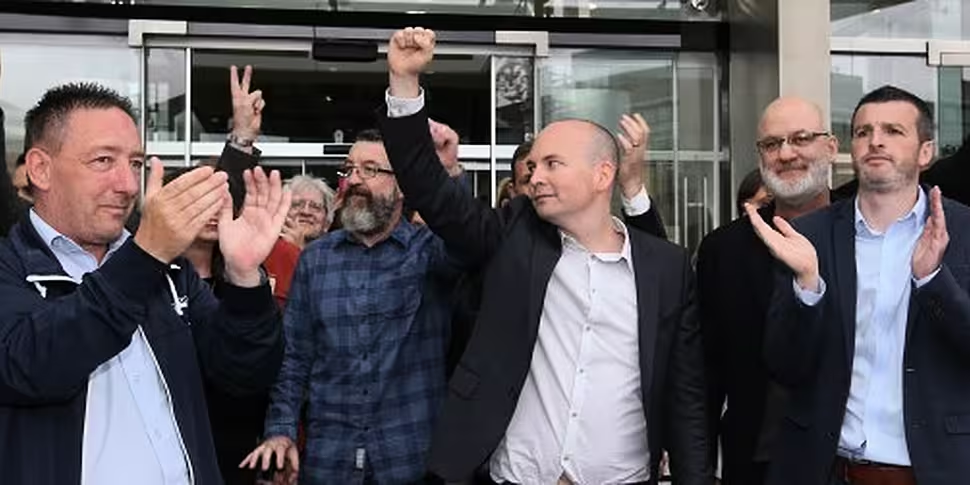A legal expert has said there is no need for changes to the law following controversy over online commentary during the Jobstown trial.
All six people accused of falsely imprisoning former Tánaiste Joan Burton and her advisor during a Jobstown water protest in 2014 were found not guilty in Dublin Circuity Criminal Court yesterday.
However, the use of social media by groups associated with the accused as the trial was ongoing has come under scrutiny following the result.
Legal advice
Trinity College law professor, Eoin O'Dell said Ireland's current contempt laws are capable of dealing with social as well as traditional media - but warned authorities may need to offer greater advice to the public about what comments are acceptable online.
He said the law is “always a bit slow to understand technology” but added that once it catches up, “the basic rules usually continue to apply.”
Under contempt of court laws, it is an offense to publish any material that might influence a jury in the run-up to – and especially during – a trial.
Professor O’Dell said he “wouldn’t be surprised” to see the DPP follow the lead of the Attorney General in the UK and begin publishing guidelines in relation to upcoming cases:
“In the UK for example, the Attorney General issues what he calls advisories relating to high profile trials to remind people that social media for example is subject to contempt laws and there are usually links to these advisories on Facebook and Twitter and so-on,” he said.
“So I wouldn’t be surprised to see the DPP here doing something similar.
Social media
One of the six accused in the trial, Solidarity TD Paul Murphy, published a succession of tweets relating to the case while it was ongoing.
Some of Mr Murphy’s tweets were sent from inside the courtroom itself – while the majority were associated with the hashtag #JobstownNotGuilty.
A number of the politician’s tweets were sent while Judge Melanie Greally was charging the Jury.
Mr Murphy also retweeted commentary from a range of others about the ongoing case – as well as videos posted by Solidarity press officer Dave Murphy.
The Solidarity press officer posted video reports on the trial which included commentary slamming the veracity of evidence provided by former Tánaiste Joan Burton and calling on the public to support the #JobstownNotGuilty campaign.
Contempt of court
Professor O’Dell said Ireland’s contempt laws are “designed to protect the administration of justice and the fairness of the trial” adding that they apply “not just in ordinary media but also on social media.”
He suggested that there are potentially two problems with Deputy Murphy’s use of social media during the trial.
“Not only is there the prospect of his tweets having an impact on the trial but also he was tweeting from within the courtroom,” he said.
“So there were two problems there and, as a law graduate, I think he was probably well aware of that.”
He warned that there is still “some scope for refinement” regarding the laws, adding that there remains uncertainty over the “extent to which it can be said you intend to impact, to have the prejudice or pre-judgement on the trial.”
He said a “well-instructed jury” should be capable of avoiding both social and ordinary media – something Judge Greally regularly warned the jury about.
Biased media coverage
On Newstalk Breakfast, one of the accused, Solidarity councillor Kieran Mahon said both the Dáil and state broadcaster RTÉ were used against the defendants.
"All you have to do is look at the media campaign that's been run over the last two and a half years against the community in Jobstown and against the defendants themselves,” he said.
"All the information we've received about our charges has been received through the State broadcaster."
"The other aspect of the political establishment... is the Dáil - the use of the Dáil by TDs, and the use of national media by TDs to criticise and frame the Jobstown protest in a certain way".
Asked about the use of social media during the trial he said “I think as long as facts are reported correctly, you're free to give opinion."
"We've had a sustained campaign by the media where the media has basically had a free run in what it said about Jobstown, in what it said about Solidarity, what it said about the AAA, Paul Murphy TD and the defendants."
Campaigners for the Jobstown Six are holding a press conference this afternoon to raise concerns about the Garda role in their attempted prosecution.









